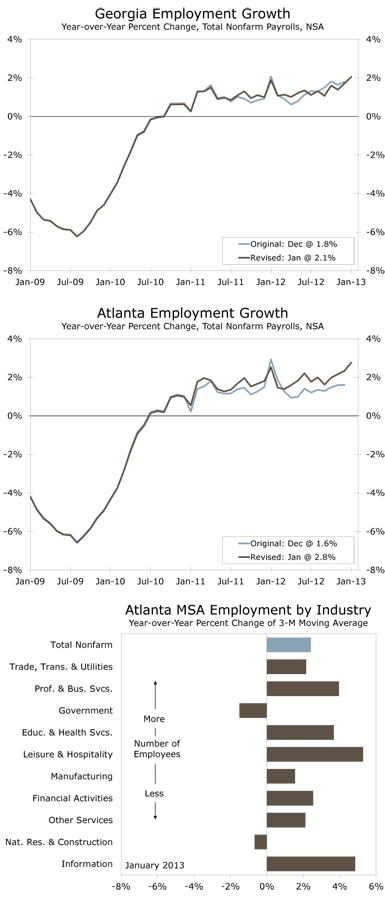State Employment Is Improving, but Few Surprises in Revisions
Georgia’s economy continues to see gradual improvement as employment has risen 2.1 percent year-over-year, adding 69,400 jobs. Gains were fairly broad based over the past year, but if there is one shortcoming in these figures it is that nearly half the jobs added during the past year were in lowwage industries such as food services and employment staffing. A few highwage areas also perked up in professional and technical services, manufacturing and logistics. Georgia’s unemployment rate remained elevated at 8.7 percent, even though the state has seen a 0.6 percentage point improvement over the past year.
Revisions to labor market data showed that 2,600 fewer jobs were added to the state than initially reported. This somewhat disappointing result was partially offset by the fact that initial data for January show Georgia employment growth gaining momentum, up 2.1 percent, the highest yearover- year growth since June 2006. The household data also show a robust gain of 78,000 jobs, which easily outpaces growth in the labor force.
Revised Data Show Atlanta’s Economy Is Back on Track
Led by strong private sector growth, Atlanta now shows much stronger job growth. Initial readings had pegged nonfarm employment growth at 1.6 percent year-over-year, but revisions show the payrolls actually grew 2.8 percent. The more positive trend in employment growth was not entirely expected since the Quarterly Census of Employment and Wages suggested that last year’s job growth had been understated. Household numbers have also been posting stronger gains. Job growth was generally broad based across industries, although employment decreased in the public sector. Professional and business services saw the largest annual gain, rising 4.5 percent. Nearly half of the jobs added in this sector were in employment services, which tend to be more heavily weighted toward parttime positions. Still, growth in employment services is usually a leading indicator of stronger overall job growth. Leisure and hospitality also posted strong gains, rising 5.4 percent, mainly due to an increase at restaurants.
Atlanta’s information sector continues to grow due to ongoing expansion in internet-related businesses and wireless communications. Growth in internet security has been a notable bright spot. Employment transportation and distribution remains solid, with growth at consumer products companies leading the way. Hiring has also picked up in professional and business services and the financial sector. While the largest portion of those gains has been at staffing companies, employment has also picked up in higher paying areas. In addition, manufacturing and construction are also gaining strength. Government remains the primary source of weakness in Atlanta, as budgets remain tight at all levels.

